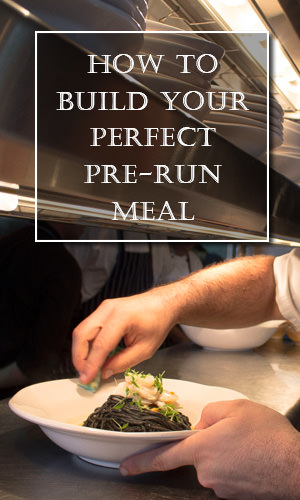
How To Build Your Perfect Pre-Run Meal

Posted on 22 Sep, 2020
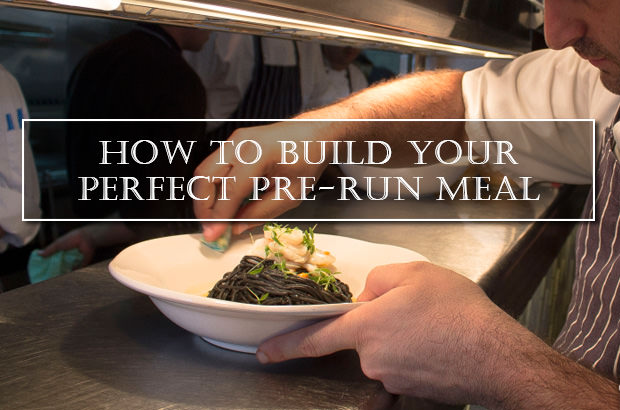
When it comes to pre-race routines, we all have different strategies. For example, some runners could be called preparers; they lay out clothes the night before, arrive hours before the race so they’re first in line for the Porta Potties, and have refreshed their weather app enough times to use up their entire data package.  Other runners, well, they aren’t preparers; they hit the snooze button three times before realizing it’s race day, show up with mismatched socks, and don’t make it to their starting corral until after the gun has fired.
Other runners, well, they aren’t preparers; they hit the snooze button three times before realizing it’s race day, show up with mismatched socks, and don’t make it to their starting corral until after the gun has fired.
Nutrition varies just as much. I once asked my Twitter followers what they like to eat before a race or long run. About 25 people responded, and nearly every answer was unique.
Here’s the thing: While it doesn’t really matter if you set out your clothes the night before or spend race morning trying to find a clean shirt, what you put in your body before a race or long run and when you eat does have an effect on your performance —a big one.
Feed Your Body and Brain
No matter how much time is spent training, nutrition can make or break a race. Anyone who’s ever had a bad run due to improper pre-workout fueling (and most runners probably have) knows that not having enough of the right foods can lead to low energy, an upset stomach, muscle cramping or spasms, and even the dreaded bonk (you know, when your body runs out of fuel and you feel like you’ve run smack into a wall).
Worse, it can hurt a runner mentally. Some of my most painful long runs and races turned sour because I started feeling hungry with an hour or more left to go. When that happened, food was all I could think about.
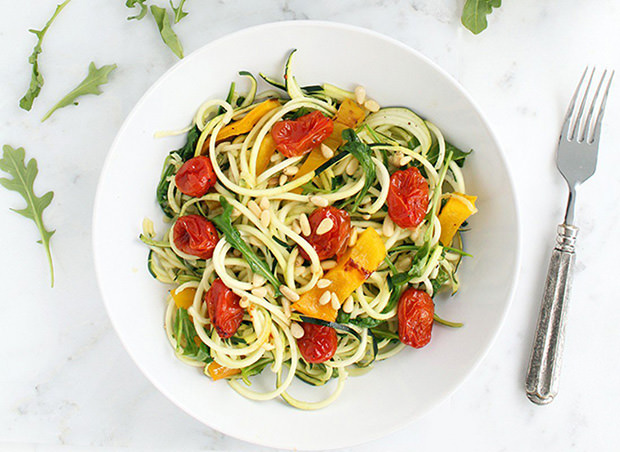 As runners, the more experience we have, the better we know our bodies and the more familiar we become with what kinds of efforts and distances require us to pay extra attention to food. This goes for what is eaten on the days leading up to the run and during the run itself, but no meal is as important as the one right before a run. If race-day nutrition is done properly, you will be energized and running strong all the way to the finish line.
As runners, the more experience we have, the better we know our bodies and the more familiar we become with what kinds of efforts and distances require us to pay extra attention to food. This goes for what is eaten on the days leading up to the run and during the run itself, but no meal is as important as the one right before a run. If race-day nutrition is done properly, you will be energized and running strong all the way to the finish line.
6 Rules to a Perfect Pre-Race Meal
Unfortunately, there’s no quick and dirty formula to figure out exactly when and what to eat since every runner’s needs are different. The only way to truly know what works for you is to test a variety of strategies and then test them again and again until you find the solution that works. Take advantage of those long training runs, and use them as test races, following these guidelines.
 1. Watch the Time
1. Watch the Time
Before we get too far into the what, let’s discuss the when. After all, what you eat doesn't matter if you don't know when to eat it.
Eating too close to the start of the race can lead to feeling heavy, bloated, and crampy, but eating too early might leave you hungry and low on energy halfway through the miles. My personal experience, and the experience I’ve had working with other runners, has lead me to believe that you should eat a meal (think light breakfast, not pasta bowl) no less than an hour before the race and a smaller snack about 15 to 30 minutes before the gun goes off.
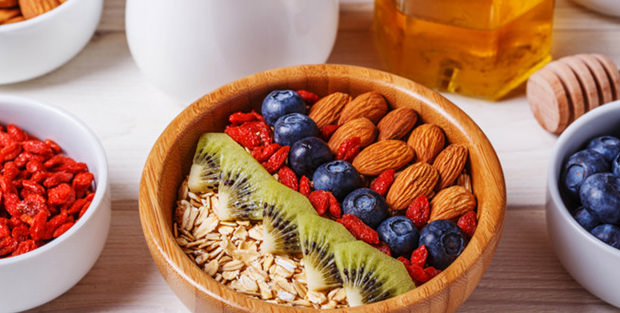 2. Strike the Right Ratio
2. Strike the Right Ratio
Race day fuel is all about optimization, and one example of that is finding the right carbohydrate-to-protein radio for your body to process and draw energy from food most effectively.
We focus most heavily on carbohydrates and protein because that’s what our bodies crave the most during exercise: Carbohydrates are an energy source, and protein will help aid and repair muscles. While optimal amounts vary from person to person, studies have shown that a carb-to-protein ratio of 3:1 or 4:1 is effective for most people.
In other words, aim for the meal to have roughly three to four times as many carbs as it does protein. For example, a plain bagel with dates and peanut butter on top (my favorite pre-race meal) has roughly 61 grams of carbohydrates and 20 grams of protein, a near perfect 3:1 ratio.
 3. Keep It Simple—and Complex
3. Keep It Simple—and Complex
There are two types of carbohydrates, simple and complex, and both are necessary for long runs. Simple carbs, found in fruits like bananas, dates, and apples, release instant energy from sugars, giving that boost you need to take off down the road or trail. Complex carbs are more, well, complex, and aren’t digested or absorbed as quickly. Found in breads, oats, potatoes (regular and sweet), and rice, complex carbs are a great source of energy for further into a race, since your body slowly burns this fuel to maintain appropriate levels of blood glucose.
 4. Figure Out Fats
4. Figure Out Fats
Fat is the most energy-dense nutrient, providing nine calories per gram while carbohydrates provide just four calories per gram. So why don’t we get our energy from fat during endurance running? Because fat takes longer for the body to break down into a useable energy source, and that conversion process takes way too much time for an endurance athlete whose body needs energy ASAP.
Take it slow and steady when experimenting with how much fat to have before a run. Eating too much too close to a race may make you feel heavy and will waste valuable energy as your body spends more time digesting the food.
 5. Frontload Electrolytes
5. Frontload Electrolytes
Electrolytes are minerals found in bodily fluids, and at the right levels, they help keep muscles functioning properly.
On race day, runners will lose electrolytes (mostly sodium and potassium) through sweat. Just as we want to make sure we’re hydrated with plenty of water, it’s also important to maintain appropriate electrolyte levels, otherwise cramping and other stomach issues may take place.
I like to frontload on electrolytes on race day with salty foods in preparation of the deficiency to come. Coconut water is another great way to get pre-run potassium.
(Warning: Too much sodium can also be an issue for runners, and proper hydration techniques are key to any successful—and safe—race.)
 6. Be Finicky About Fiber
6. Be Finicky About Fiber
Be careful when it comes to high-fiber foods, which are famous for keeping digestion, um, moving. I’m just going to come out and say it: Having to poop during a race is never fun. And sometimes it can get messy. You don't want that. Trust me.
The Build-Your-Own-Pre-Race-Meal Formula
To help put this all together and eliminate the guessing that goes into finding the right foods, I’ve created a mix-and-match cheat sheet featuring some of my favorite pre-race foods. It’s designed to help you create your perfect meal. Just pick one from each of the categories below and combine.
Nutrition facts are pulled from the USDA National Nutrition Database for Standard Reference and may not match exactly with a particular brand or product, but these numbers will give you a good idea on where to start.
1. Carb Base
- Whole wheat bread (1 slice):
81 calories, 1g fat, 14g carbs, 4g protein, 2g fiber, 146mg sodium - White bread (1 slice):
77 calories, 1g fat, 14g carbs, 3g protein, 1g fiber, 142mg sodium - Plain bagel (1 medium):
277 calories, 1g fat, 55g carbs, 11g protein, 2g fiber, 443mg sodium - Oatmeal (1 packet plain instant):
150 calories, 2.5g fat, 27g carbs, 7g protein, 4g fiber, 2mg sodium - Sweet potato (1 medium baked):
103 calories, 0g fat, 24g carbs, 2g protein, 4g fiber, 41mg sodium - Coconut water (1 cup): 46 calories, 0.5g fat, 9g carbs, 2g protein, 3g fiber, 252mg sodium
2. Protein Topper
- Almond butter (2 tablespoons):
196 calories, 18g fat, 6g carbs, 7g protein, 3g fiber, 73mg sodium - Peanut butter (2 tablespoons):
191 calories, 16.57g fat, 7g carbs, 7g protein, 2g fiber, 136mg sodium - Hummus (2 tablespoons):
50 calories, 3g fat, 4g carbs, 2g protein, 2g fiber, 114mg sodium - Bacon (1 slice pork):
54 calories, 4g fat, 0g carbs, 4g protein, 0g fiber, 194mg sodium
3. High-Glycogen Fruit
- Medjool date (1)
66 calories, 0g fat, 18g carbs, 0g protein, 2g fiber, 0mg sodium - Banana (1 medium):
105 calories, 0g fat, 27g carbs, 1g protein, 3g fiber, 1mg sodium - Raisins (1 ounce):
85 calories, 0g fat, 22g carbs, 1g protein, 1g fiber, 3mg sodium - Apple (1 medium):
95 calories, 0g fat, 25g carbs, 0g protein, 4g fiber, 2mg sodium
Great Books On Nutrition For Runners

by Joanna Sayago Golub

by Shalane Flanagan

by Joanna Sayago Golub

by Matt Fitzgerald
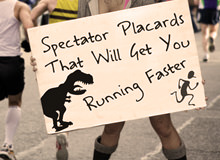 Spectator Placards That Will Get You Running Faster
Spectator Placards That Will Get You Running Faster How To Be An Endurance Athlete And Vegetarian
How To Be An Endurance Athlete And Vegetarian 5 Expert Tips for a Stress-Free Marathon
5 Expert Tips for a Stress-Free Marathon Common Food Labelling Tricks
Common Food Labelling Tricks










